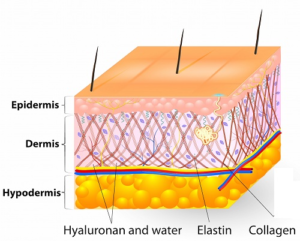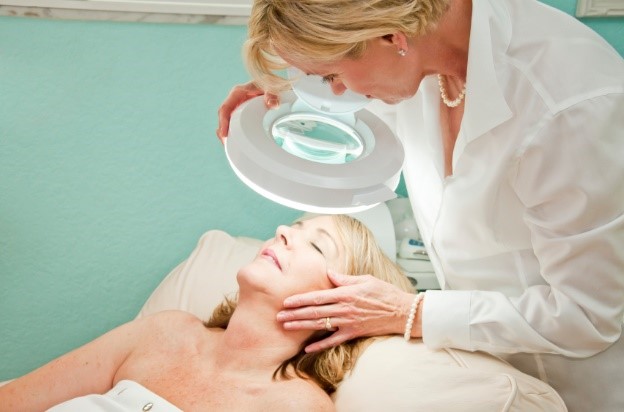About Our Skin
Skin is the outer covering of the body and in fact is the largest organ of the body covering about 20 square feet. It is composed of two layers the epidermis and the dermis. Not only is the skin the largest organ of the body; but it is your body’s first layer of defense from outside the outside environment.
The outer layer, the epidermis, is comprised of four layers, which are responsible for keeping water in, keeping infection out and helping to regulate body temperature – among other vital functions. The inner layer, the dermis, is composed mainly of connective tissue that provides the strength and elasticity your skin needs to resist stressors. Both layers are vital in understanding and treating nearly all skin conditions and concerns.
Many factors contribute to the outward appearance of your skin: environmental aggressors like the sun, pollution, and the weather; internal aggressors, like diet and hydration; and your own biochemistry, such as hormones and genetic predispositions. Whether you are looking to improve aging skin, acne, pigmentation irregularities, rosacea or other conditions, the intricate skin system requires a multifaceted approach to treatment.
Keeping your skin as healthy as you can, will help you to keep from getting sick, or sustaining damage to internal structures like bones, muscles, and internal organs. Its significance cannot be overlooked in a total wellness approach to life because it provides many important functions such as:
- Providing a protective barrier from elements and injury
- Regulates body temperature and acts as an insulator
- Helps the body eliminate waste (toxins) with perspiration
- Permits the sensations of touch, heat, and cold
- Produces protective pigmentation guarding from sun exposure
- Immunological functions and protection from microorganisms
- Synthesis of vitamin D assisting with cell growth, immunity, and reduction of inflammation
Our skin is a good indicator of our overall health. Every day our skin is attacked by sun, smoke, pollution, and the passage of time (aging). Our skin looks younger and healthier when it gets the nutrients and oxygen it needs. Incorporating some daily routines can assist with overall skincare such as:
- Drinking eight (8) glasses of clean water
- Getting eight (8) hours of sleep
- Protection from the sun, weather, & pollution
- Walking in fresh air
- Eating fresh fruits and vegetables (less processed and junk)
- Minimizing stress and maintaining balanced hormones
For those wanting the ultimate in skin care there are many ways which include the various processes of cleansing, exfoliation, extraction, moisturizing, and protection. Our licensed Estheticians will consult with you regarding your current skin condition, skin type, lifestyle, and your skin care goals. Working together; esthetician and client develop a treatment plan specific to you, for both in esthetic service in spa and daily skincare regimen at home.
What is an Esthetician?
Estheticians are trained in skin wellness; most often helping their clients combat complexion problems through a number of therapies and practices. They skilled in therapies that are designed to improve the tone, texture, color, and youthfulness of the skin of the face and neck. Estheticians may perform a wide range of body therapies, as well, such as salt or sugar scrubs, body wraps, and hair removal.
The work of estheticians involves applying treatments and performing procedures to the skin as a way to maintain its health and vitality, improve its overall appearance, and combat the effects of sun exposure and aging. Estheticians also often use mechanical or electrical appliances and devices, such as microdermabrasion machines, brushing machines, LED lighting, atomizers, and galvanic current to achieve the desired effect. Their work involves the use of creams, lotions, masks, serums, and wraps, many of which are created with antioxidants, botanicals, essential oils, and infused scents that provide the client with a sensory experience that promotes relaxation and rejuvenation.



